- Home
- Trevor Scott
Extreme Faction
Extreme Faction Read online
EXTREME FACTION
A Jake Adams International Espionage Thriller #2
Trevor Scott
SALVO PRESS
An Imprint of Start Publishing LLC
New York, New York
Also by Trevor Scott
Fractured State (A Novella)
The Nature of Man
Discernment
Way of the Sword
Drifting Back
Fatal Network (Jake Adams #1)
Extreme Faction (Jake Adams #2)
The Dolomite Solution (Jake Adams #3)
Vital Force (Jake Adams #4)
Rise of the Order (Jake Adams #5)
The Cold Edge (Jake Adams #6)
Without Options (Jake Adams #7)
The Stone of Archimedes (Jake Adams #8)
Boom Town (Tony Caruso #1)
Burst of Sound (Tony Caruso #2)
Hypershot (Chad Hunter #1)
Global Shot (Chad Hunter #2)
Strong Conviction
The Dawn of Midnight
Duluthians: A Collection of Short Stories
The Hobgoblin of the Redwoods (A Young Adult Mystery)
This is a work of fiction. All characters and events portrayed in this novel are fictitious and not intended to represent real people or places.
EXTREME FACTION © 2012 by Trevor Scott.
This edition of EXTREME FACTION © 2013 by Salvo Press.
All Rights Reserved. No part of this book may be reproduced in any manner without the express written consent of the publisher, except in the case of brief excerpts in critical reviews or articles. All inquiries should be addressed to Salvo Press, 609 Greenwich Street, 6th Floor, New York, NY 10014.
Published by Salvo Press,
an imprint of Start Publishing LLC
New York, New York
Please visit us on the web at
www.start-media.com
Cover iStock Photos by Sadık Güleç and SCM Studios.
ISBN: 978-1-62793-414-5
Visit the author at: www.trevorscott.com
Acknowledgments
To the twenty million people of Kurdistan in Iraq, Iran, Turkey and scattered about the Earth, I hope you find freedom and autonomy soon. I by no means wanted to imply with this book that Kurds are terrorists. I have the utmost respect for the Kurdish people everywhere. You are a proud people with a great history and a bright future. To the people of Odessa, Ukraine, please forgive me for placing streets where they shouldn’t be. As always, I salute my Air Force, Army, Navy and Marine Corps colleagues past and present—millions of dedicated men and women who have kept this nation free. To the land of the moose and wolves and the Greater Mesabi Men’s Book Club, may the beer and the testosterone continue to flow. Rest in Peace Colin Isaacson.
PROLOGUE
IRAQI KURDISTAN
March 1988
A cool breeze swept down out of the mountains. The man dressed in the local attire of a sheep herder, his beard thick and dark, sat down against the trunk of a pine. He brought his closed left fist from his side to his lap and slowly opened his fingers. Sitting there, still in shock, was a black beetle, the name of which he had no clue. Suddenly, legs started moving, tickling his palm, as the bug made its way up his index finger and sat helplessly, its antennae scanning the air for an escape route.
Without any further hesitation, the man popped the bug into his mouth, crunched down once and swallowed. Surprised, he hunched his shoulders and started searching among the rocks, needles and leaves for relatives or distant cousins.
Then with the soft, cool air came a sound that he knew well. Jets. More than one. Quickly he pulled a pair of camouflaged folding binoculars from inside his shirt, to his eyes, and began to focus.
Within seconds, two Mirage F1s, side-by-side, swooped down between the mountains, barely above the ragged tree-tops, and crossed right in front of him. He had just a flash to focus the optics as the two jets whizzed by him.
Drop tanks? No. They were on the outer pylons. Some type of bomb.
He only wished he had caught the tail markings, something more than the Iraqi Air Force symbol. Some clue to where they had come from.
In less than a minute, he heard a percussion. Nothing loud like a two thousand pounder. An air burst? That made no sense. The jets would have still been in Iraq. Unless... Then he saw the jets off in the distance, above the mountains, drifting slowly back toward the west like knights having vanquished dragons.
Gathering his backpack, he jumped to his feet and began running along the ridge, pushing back the tree limbs in his way and slipping among the rocky embankment. When he came to a high precipice overlooking the valley below, he stopped suddenly, breathing heavily, and brought the binoculars to his eyes. He expected to see plumes of smoke, buildings burning, maybe even tanks or artillery or some other metal contraption twisted and mangled beyond recognition. But he saw none of that. There was nothing. Only the village.
He checked his map and compass, verifying he wasn’t entirely crazy from his diet of bugs and worms for the last few days, but he was right. He could see that the village was in Iraq, although close enough to the border of Iran to almost forgive such a mistake, but only if the pilots too had been sleep deprived like him. This wasn’t a mistake.
A shocking revelation swept through his body when he realized how stupid he had been. An air burst without damage. Proof of why he was there. The Iraqis were using chemicals or biological agents on their own people.
He thought of running as fast he could, but knew he could never outrun what had come from those bombs. Only the air could save him. He grasped a handful of dirt and threw it into the air and watched the particles float off the cliff toward the village. The air would clear toward Iran, he realized. But he would have to wait. How long? Thinking back on his training, he wasn’t entirely sure. Perhaps nobody really knew that answer.
After he had made up his mind to ascend the mountain to the village, his plans were changed by repeated air strikes. The second wave had been older MIG 23s, and then the Swiss Pilatus aircraft, turboprops buzzing like a saw through the air. More airbursts followed by cluster bombs.
He watched the sun set on the village that night, and then the next day he slowly worked his way down out of the mountains to a dirt road leading toward the village.
It did not take long for his fears to be realized. First there was the flock of sheep, some twenty or so, lying alongside the road, bloated like someone had pumped them full of air. In the ditch next to them, his arms wrapped around a dog, was the herder, his mouth contorted and his eyes missing. His skin was blotched with pustules.
He wanted to be anywhere but there. He could simply turn around and make his way north across the border into Turkey, the way he had come. Find a phone and contact Incirlik to have an air force helicopter pick him up. But for some reason he knew he had not seen the worst of it. He had to move forward, if for no other reason than to witness the horror that lay ahead.
When he reached the village, there would be no escape now. Corpses lay strewn about the street, piled like firewood against ancient stone walls. Moans of pain echoed through the alleys.
He drifted among those still living, some with horrible open sores on their face, hands and arms. It was not as if he knew what he had to do, as he knew what he had to see and hear and feel. With all his knowledge and training, he was still helpless. He could do nothing. And perhaps that was the greatest horror of all.
That evening, as he stumbled out of town, he came across the young woman. She was perhaps fifteen, with long black hair, passionate eyes that had been crying for a long time, and a blank stare looking off to nowhere.
She had been to the village, she said. Everyone was dead in her family but her. And
only because she had been sent to the neighboring village to buy a goat for her father. Now she could not even find the goat. She searched about the area, her eyes shifting wildly. The goat was gone.
He took her into his arms and held her. Then the two of them shuffled out of the village, never turning back, never trying to think what had happened there. To think would drive to insanity, for insanity is what it was.
1
ODESSA, UKRAINE
Now
A red glow lingered across the Black Sea harbor, as the dark Volga sedan pulled up to the curb at the base of the Potemkin Steps. The driver cut the lights, but kept the engine running.
In the passenger seat, Jake Adams started to open the door.
“Just a minute,” the driver said, reaching for the glove box. He retrieved a bundle, a rag wrapped around something and held in place with a rubber band. “Here. You might need this. Odessa is a dangerous place now.”
Jake took the package from Tully O’Neill, the Odessa station chief for the new CIA. “I see the Agency spares no expense with packaging,” Jake said.
The driver let out a breath of air as he lit one cigarette from another.
As Jake unwrapped the package, he found what he had asked for earlier in the day, a 9mm automatic. “A Makarov?” Jake said. “Jesus Christ, are you trying to get me killed?”
Tully hunched his shoulders and puffed on his cigarette, bringing the tip to a bright orange. “Short notice,” he said. “Took it off a dead Russian last month.”
“How’d he get that way?”
The Odessa station chief smiled, letting out a stream of smoke in the process. “His magnetic personality attracted a shitload of lead.”
Jake inspected the gun, pulled out the magazine from the butt and ran his thumb over the top round. “Standard Soviet-era 9mm jacketed.” He shook his head. “I’ll be lucky if the fuckers don’t blow up in my face.”
Shrugging, Tully continued his assault on his cigarette.
Jake strapped the gun under his sweater and then swung his leather jacket over that. He went for the door handle again.
“Keep an eye on Tvchenko,” Tully said. It was more of an order than a request. “I’ll bet my left nut he still has ties to the GRU.”
“I don’t know about that.” From what Jake had heard, Russian military intelligence had truly become the oxymoron civilians joked about.
“Trust me.” Tully smiled like a politician about to screw his constituents. “The Cold War might be over, but there are some who’d rather go back to the good old days.”
“He’s denounced chemical and biological weapons publicly...” Jake stopped himself in mid-thought, knowing that he didn’t believe his own words.
“Yeah, I heard the two of you got along like a couple of comrades,” Tully said. “Bought his vodka-induced drivel when he told you the Russians forced him to come up with the most deadly fuckin’ weapons known to man. The kind that make you wish you’d been nuked all to hell.”
Nobody had to tell Jake about that. He was constantly haunted by the memory.
“People change.”
“Don’t count on it.” Tully checked his watch. “You better get going. Your employers might be expecting a little protection. After all, that’s what they hired you for.” He let out a slight laugh and then continued, “Call me after dinner and I’ll pick you up and debrief.”
Jake got out and shut the door on a cloud of smoke. Almost immediately the Volga pulled away from the curb, its lights flicking on, and then lost its way around the harbor road.
Glancing around, Jake started up the long flight of stairs. When he reached the top of the Potemkin Steps, he hesitated for a moment and swiveled his head about, studying both directions of the quiet street.
Suddenly, two blocks up the road, a dark Mercedes sedan pulled away from the curb, turned its lights on after twenty meters, and cruised toward him slowly.
He tensed his left biceps against the gun butt under his jacket, almost reached for it, and then thought better of it as the sleek sedan passed by. No concern there.
Letting go with a cleansing breath, he glanced back down the stairs he had just climbed.
Satisfied he had not been followed, he stepped lightly along the cobblestone sidewalk, the cushioned soles of his hiking tennis shoes barely audible over his own heart beat.
Jake Adams knew he was being excessively cautious. It was a habit he had learned first in Air Force intelligence during his counter terrorism briefings. Never pattern yourself. Never travel to work the same way each day. Later, when he worked for the old CIA, he had refined those skills. Backtrack unexpectedly. Use windows for mirrors. It was all coming back to him in the darkened streets of Odessa. Some things he could never forget.
As he got closer to the Maranavka Hotel, one of the oldest and best preserved in Odessa, he noticed others dressed in their finest suits, dropping off expensive cars with the valet, and then regally strolling through the grand entrance like movie stars at a premiere. He, on the other hand, wore casual khakis, a gray sweater, and a black leather jacket. He assured himself that the blood red tie, although barely visible, was dressy enough for any occasion.
He continued toward the hotel door.
It had been one of the most beautiful spring days the city had seen in years. The agricultural conference at the university had kept all the attendees inside, locked in meetings on how to reduce crop loss to insects, and how new strains of wheat were far more resistant to harsh winters. Luckily, Jake had avoided that.
Flashing a name tag at the two armed doormen, Jake wandered inside.
The first day of the three-day conference was over, and most in attendance had looked forward to a dinner party where much of the real business would take place. He knew the scientist he had met years ago would be there to give a speech, and he was looking forward to talking with the man again to see for himself the transformation he had heard about. Had the man really changed that much?
Hesitating in the entrance of the expansive ballroom, Jake scanned the room. The place was over a century old, with mirrors on both sides that reminded him of the Palace of Versailles, giving the room a false impression of great width. The domed ceiling was high, its carved white wood trimmed with gold.
Noticing his colleagues across the room at the bar, Jake smiled at MacCarty and Swanson as he approached them.
“I see you two have started without me,” Jake said, picking up a glass of champagne from a tray on the bar. Technically he was working, but one glass wouldn’t hurt.
MacCarty and Swanson were from Bio-tech Chemical Company of Portland, Oregon. During the day they had split up into various lecture halls, pitching their most recent insecticides and fertilizers. Bio-tech president, Maxwell MacCarty, and his assistant, Bill Swanson, the vice president of research and development, had wanted for years to push for lucrative new markets in Eastern Europe and the former Soviet countries. They already had an extensive share of the U.S. market, had penetrated the tough Western European countries, and had started making a move in Southeast Asia. But the Ukraine, the bread basket of Eastern Europe, was a wide open market and MacCarty knew it.
And that was one reason MacCarty had hired Jake just a week prior to his departure for the agricultural conference in Odessa. Jake had built his security business in Portland into a respectable, exclusive entity of one. His reputation had grown significantly in the three short years since going private. Working alone had its advantages, not having to depend on someone else’s mistakes, but he did miss the camaraderie of his past.
The dinner party was just beginning. Guests were still streaming in. There were company representatives from all the major industrialized nations: Germany, France, Italy, Japan, England, as well as from countries like Spain, Israel, Russia, Belarus. All of the companies had one thing in common. They wanted to sell their products to anyone who would buy them, and perhaps exchange ideas that could be useful in their home countries.
In his late thirtie
s, Jake had already lived an interesting life. Had seen more of the world than a dozen others would ever see. He had a strong face that always needed a shave. His longer, dark hair, looked like it had come directly from a stiff breeze and he had combed it back hastily with his fingers, which was never far from the truth. Dressed as he was in leather and cotton, he looked more like a hunting guide than the company executive he was pretending to be.
His employers resembled the comedy duo Abbott and Costello. MacCarty was the tall, slim one with just enough brains to keep the short and socially inept Swanson from making a total ass of himself.
MacCarty, dressed impeccably in a three-piece Italian suit, set his glass on the bar. “Did you meet up with any old friends?”
Jake shook his head. “Afraid not. They’ve all been transferred.” Jake had told them that he had worked for a while at the Odessa consulate. He had actually passed through many times during the destruction and withdrawal of chemical and biological weapons from the Ukraine, after attending a quick course at the defense language school in Monterey. At the time, he was a captain with Air Force intelligence, and an expert in chemical and biological weapons. His degree in geopolitics and his master’s in international relations had given him a broad picture of the world. That was one of the reasons the CIA had originally recruited him, and even a better reason to quit. He wasn’t great at following orders blindly. Those were things for ignorant young soldiers to do. And God knew the world had always needed those.
Swanson was a short, balding man with a tubular midsection. His exercise regimen consisted of turning the steering wheel vigorously as he searched for the closest parking spot to a burger joint, while maintaining control of his jelly donut.
“You missed the last meeting today, Jake,” Swanson said. “It was an interesting talk by the former chief of the Agriculture Research Institute in Kiev. They’ve discovered a chemical that kills bugs on the spot and then infects the larvae as well. It makes them sterile.”

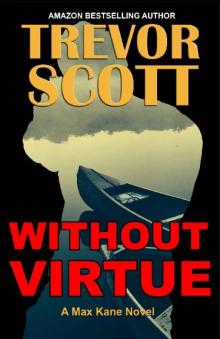 Without Virtue
Without Virtue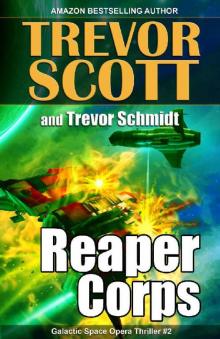 Reaper Corps
Reaper Corps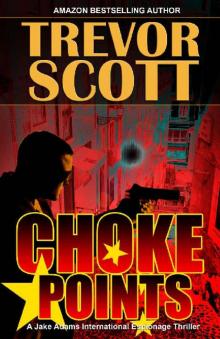 Choke Points
Choke Points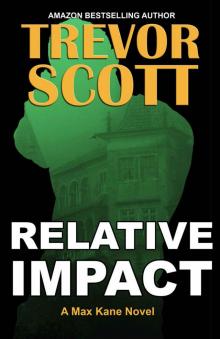 Relative Impact
Relative Impact![[Jake Adams 01.0] Fatal Network Read online](http://i1.bookreadfree.com/i/03/20/jake_adams_01_0_fatal_network_preview.jpg) [Jake Adams 01.0] Fatal Network
[Jake Adams 01.0] Fatal Network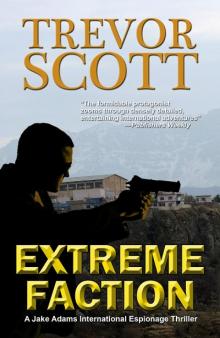 Extreme Faction
Extreme Faction The Hobgoblin of the Redwoods
The Hobgoblin of the Redwoods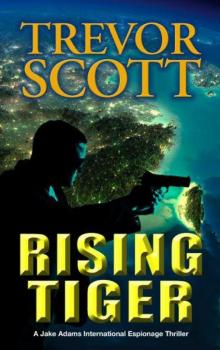 Rising Tiger
Rising Tiger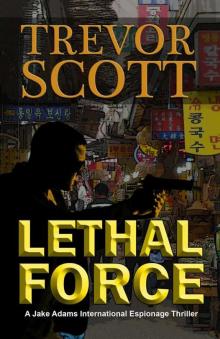 Lethal Force
Lethal Force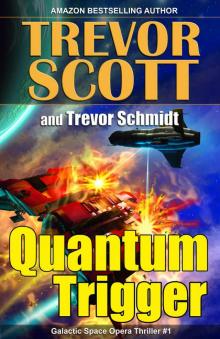 Quantum Trigger
Quantum Trigger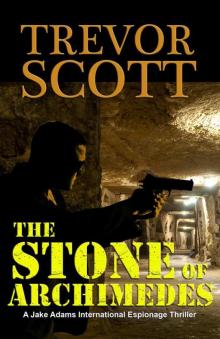 The Stone of Archimedes
The Stone of Archimedes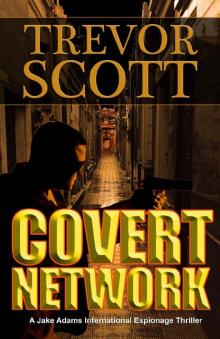 Covert Network (A Jake Adams International Espionage Thriller Series Book 14)
Covert Network (A Jake Adams International Espionage Thriller Series Book 14)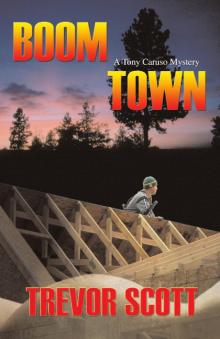 Caruso 01 - Boom Town
Caruso 01 - Boom Town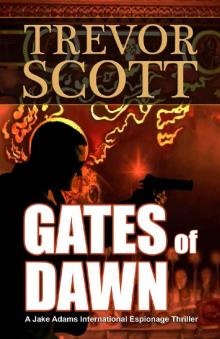 Gates of Dawn (A Jake Adams International Espionage Thriller Series Book 12)
Gates of Dawn (A Jake Adams International Espionage Thriller Series Book 12)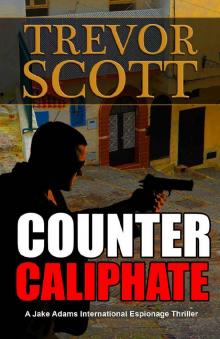 Counter Caliphate (A Jake Adams International Espionage Thriller Series Book 11)
Counter Caliphate (A Jake Adams International Espionage Thriller Series Book 11)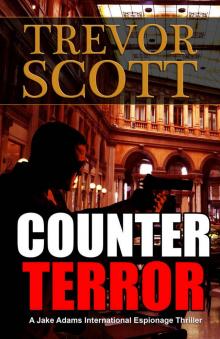 Counter Terror (A Jake Adams International Espionage Thriller Series Book 13)
Counter Terror (A Jake Adams International Espionage Thriller Series Book 13)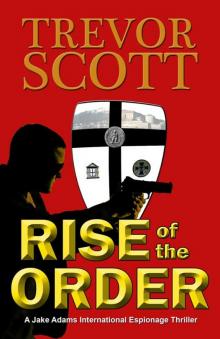 Rise of the Order
Rise of the Order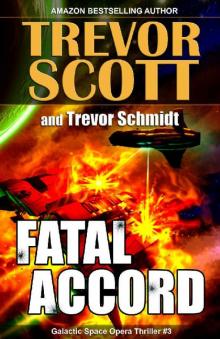 Fatal Accord
Fatal Accord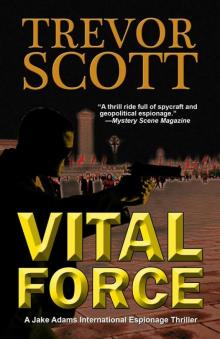 Vital Force
Vital Force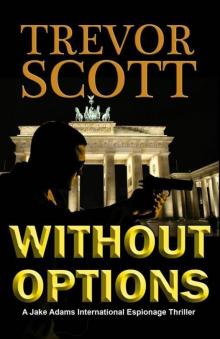 Without Options
Without Options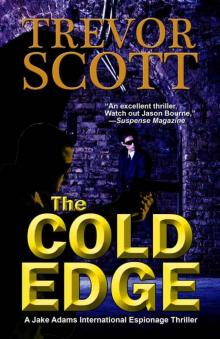 The Cold Edge
The Cold Edge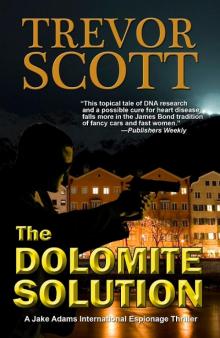 The Dolomite Solution
The Dolomite Solution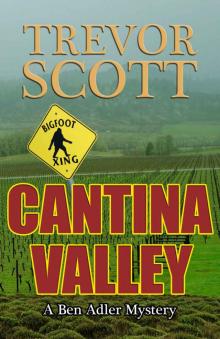 Cantina Valley (A Ben Adler Mystery Book 1)
Cantina Valley (A Ben Adler Mystery Book 1) Fatal Network
Fatal Network